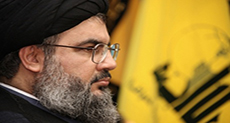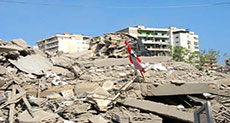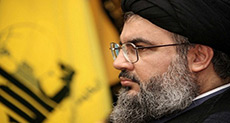Two Years on Divine Victory, "Israel" Still Paying Price!

Source: Al-Manar TV, 14-8-2008
Two years on the Divine Victory, the Zionist entity is still paying the price and regretting waging the July 2006 war that led to a historical defeat marking the beginning of ""Israel's" elimination," as said by the leader of the resistance Sayyed Hassan Nasrallah.
Indeed, it has been proven that "Israel", that was believed to have the strongest army in the region, is not more than a lie fabricated by the international community and in fact it is only a "spider web" if not weaker, said Sayyed Nasrallah.
The "Israeli" defeat, achieved two years ago, has turned the pages of Zionist superiority and exposed the nature of the "Israeli" society that found itself, for the first time since its establishment, facing the most crucial crisis that stretches out to every strategic aspect and fails to find a way out given that its leaders, culture, army, mass media and all of its tools were exposed in front of the whole world.
""Israel" is different than all states in the fact that its presence becomes doubtful when the army loses its strength as well as the confidence of its people," "Israeli" affairs expert and Assafir daily columnist Hilmi Mussa told Al-Manar website. He stressed that the outcome of the July war frustrated the "Israelis" and dashed their hopes in their political leadership but most importantly the military ranks," adding that the absence of confidence was clearly reflected in the two years that followed the defeat, uncovering many of the drawbacks of the "Israeli" society.
WHAT HAPPENED TO THE "STRONGEST" ARMY IN REGION?
Nothing pointed to an "Israeli" victory in the course of the 33-day war, despite the massive destruction and loss of Lebanese civilian life. As the announced objective in Tel Aviv was to crush Hizbullah once and for all, with US and Arab blessing, the resistance's fire power maintained high efficiency thus causing frustration to the "Israeli" command. Furthermore, the "Israeli" Air Force bank of targets dried out and the heavily protected and sophisticated Merkava tanks were dealt a serious blow.
"Israel" acknowledged that Hizbullah's effectiveness and determination led to the defeat of their army.
"The most significant sign of the "Israeli" failure was declared by "Israeli" Prime Minister Ehud Olmert when he said, ahead of the Winograd Commission, that the "Israeli" army has lost confidence in its own self before losing the trust of the "Israeli" people," Mussa said. "The decision to go to war gained significant backing from the people," the expert added. "The enemy (of "Israel") was little and limited in their eyes; yet, the results came catastrophic."
Clearly, there is a huge gap between the army's boastful arrogance, on which generations of "Israelis" have grown up, and the image that projected in the wake of the August 14 victory. Actually, facts speak for themselves.
The fighting lasted for 33 bloody days, during which "Israel" achieved none of its objectives: it didn't destroy Hizbullah, it didn't stop the barrage of rockets slamming into its northern settlements, and it didn't return its two captured soldiers.
Never had "Israel's" deterrent capability and reputation suffer such a blow. Never had "Israel" fought an Arab army for less than a week before overcoming it. But it was the first time in the Zionist entity's history that it engages in a 33-day war, the fiercest ever, and gets defeated.
The "Israeli" public wanted to know what happened to their "mighty" army.
On August 28, Olmert announced the creation of a probe committee led by former director of Mossad Nahum Admoni; it became the prototype for the Winograd Commission. A military probe, led by former Chief of Staff, Amnon Lipkin-Shahak which on August 22 ceased work after five days of operations due to increasing public dissatisfaction and calls for a state commission, was also set to be renewed. Olmert hinted that the State Comptroller would examine the homefront. In response to these growing criticisms, Olmert chose to replace Admoni with retired judge Eliyahu Winograd as chair of the governmental inspection probe (with Olmert thereby responding to calls that any leading commission or probe needs to be headed by a retired judge); the probe itself, turned into a commission with a wider mandate, amounting to near-equal authority to a state commission.
According to the Winograd Commission Report, the July War was regarded as a "missed opportunity" and that ""Israel" initiated a long war, which ended without a defined military victory". The report continued to state that "a semi-military organization of a few thousand men resisted, for a few weeks, the strongest army in the Middle East, which enjoyed full air superiority and size and technology advantages". Furthermore, Hizbullah's rocket attacks continued throughout the war and the "Israeli" forces did not provide an effective response to it. Following a long period of using standoff fire power and limited ground activities, the "Israeli" forces launched a large scale ground offensive close to the UN Security Council's resolution which imposed a cease-fire. "This offensive did not result in military gains and was not completed".
Night of July 12th to react (to the detention) with immediate and substantive military action and to set... ambitious goals." This decision had immediate repercussions in that subsequent decisions were limited mainly to a choice between "a short, painful and unexpected blow on Hizbullah and to bring about a significant change of the reality in South Lebanon with a large ground operation, occupying South Lebanon and 'cleaning' it of Hizbullah". "The fact "Israel" went to war before it decided which option to select and without an exit strategy, all these constituted serious failures of the decision making process," the Winograd report concluded.
OPERATION AL-REDWAN: ANOTHER "Israeli" FAILURE!
Two years after the war, Sayyed Nasrallah's pledge to release Lebanese detainees from "Israeli" jails was fulfilled "through indirect negotiations and exchange."
"Israel" claimed it had launched the July war to return its captured soldiers "immediately." But for two whole years, "Israel" even failed to determine the fate of its soldiers. It was until the last moment of the swap deal between Hizbullah and "Israel" that they knew that both soldiers were dead.
The swap deal was dubbed by Hizbullah "Operation Al-Redwan" after the commander of the resistance Imad Moghnieh or Hajj Redwan. Martyr Moghnieh was assassinated in Syria on the 12th of February 2008 by Mossad agents. Five Lebanese detainees were released, including Samir Kintar who spent some 30 years in detention. Kintar's release alone was regarded by "Israeli" media as a severe blow; and "Israel's" chief rabbi described it as "the blackest of all black days from every aspect."
The remains of 200 Lebanese and Arab martyrs were also retrieved from "Israel's" so called ‘cemetery of numbers." The death of some martyrs dates back to the late 1970's.
"The real value of the Operation Al-Redwan resides in its mere ratification," "Israeli" affairs expert Holmi Mussa told Al-Manar website. "It was therefore another defeat for the Zionist entity. The most important thing is that the operation was achieved against "Israel's" will and reluctance."
TRIO THAT IMPLICATED "ISRAEL" INTO 'DAMNED WAR' OUT OF POWER!
Meanwhile, the last but not least repercussion of the war extended to Olmert himself as he declared last week that he intends to quit once a new Kadima leader would be elected, thus following the steps of political and military leaders who "chose" to resign as a result of the July war fiasco.
"The complete trio that was responsible of this war became therefore out of power: Olmert as well as the then Defense Minister Amir Peretz and Chief of Staff Dan Halutz who quitted or were dismissed earlier," Mussa noted.
Major General Udi Adam, who led "Israel's" northern command during the 33-day war, was the first "Israeli" official to quit thus fuelling calls for further heads to roll.
"ISRAEL" UNDERSTANDS THE HIGH PRICE OF ANOTHER ADVENTURE
The humiliating withdrawal of "Israeli" occupation soldiers from most of Lebanese territory represented a lingering stigma on "Israel". The attempt to save face in 2006 has failed, but will "Israel" refrain from embarking on new adventures in Lebanon?
"The July experience is still haunting the "Israelis", they cannot forget it, at least now," Mussa noted, expressing doubts over the possibility of "Israel" committing another mistake in the near future.
""Israel" understands the high price it has to pay if it plunges itself into any other adventure in Lebanon," Mussa told Al-Manar.
Two years on the Divine Victory, the Zionist entity is still paying the price and regretting waging the July 2006 war that led to a historical defeat marking the beginning of ""Israel's" elimination," as said by the leader of the resistance Sayyed Hassan Nasrallah.
Indeed, it has been proven that "Israel", that was believed to have the strongest army in the region, is not more than a lie fabricated by the international community and in fact it is only a "spider web" if not weaker, said Sayyed Nasrallah.
The "Israeli" defeat, achieved two years ago, has turned the pages of Zionist superiority and exposed the nature of the "Israeli" society that found itself, for the first time since its establishment, facing the most crucial crisis that stretches out to every strategic aspect and fails to find a way out given that its leaders, culture, army, mass media and all of its tools were exposed in front of the whole world.
""Israel" is different than all states in the fact that its presence becomes doubtful when the army loses its strength as well as the confidence of its people," "Israeli" affairs expert and Assafir daily columnist Hilmi Mussa told Al-Manar website. He stressed that the outcome of the July war frustrated the "Israelis" and dashed their hopes in their political leadership but most importantly the military ranks," adding that the absence of confidence was clearly reflected in the two years that followed the defeat, uncovering many of the drawbacks of the "Israeli" society.
WHAT HAPPENED TO THE "STRONGEST" ARMY IN REGION?
Nothing pointed to an "Israeli" victory in the course of the 33-day war, despite the massive destruction and loss of Lebanese civilian life. As the announced objective in Tel Aviv was to crush Hizbullah once and for all, with US and Arab blessing, the resistance's fire power maintained high efficiency thus causing frustration to the "Israeli" command. Furthermore, the "Israeli" Air Force bank of targets dried out and the heavily protected and sophisticated Merkava tanks were dealt a serious blow.
"Israel" acknowledged that Hizbullah's effectiveness and determination led to the defeat of their army.
"The most significant sign of the "Israeli" failure was declared by "Israeli" Prime Minister Ehud Olmert when he said, ahead of the Winograd Commission, that the "Israeli" army has lost confidence in its own self before losing the trust of the "Israeli" people," Mussa said. "The decision to go to war gained significant backing from the people," the expert added. "The enemy (of "Israel") was little and limited in their eyes; yet, the results came catastrophic."
Clearly, there is a huge gap between the army's boastful arrogance, on which generations of "Israelis" have grown up, and the image that projected in the wake of the August 14 victory. Actually, facts speak for themselves.
The fighting lasted for 33 bloody days, during which "Israel" achieved none of its objectives: it didn't destroy Hizbullah, it didn't stop the barrage of rockets slamming into its northern settlements, and it didn't return its two captured soldiers.
Never had "Israel's" deterrent capability and reputation suffer such a blow. Never had "Israel" fought an Arab army for less than a week before overcoming it. But it was the first time in the Zionist entity's history that it engages in a 33-day war, the fiercest ever, and gets defeated.
The "Israeli" public wanted to know what happened to their "mighty" army.
On August 28, Olmert announced the creation of a probe committee led by former director of Mossad Nahum Admoni; it became the prototype for the Winograd Commission. A military probe, led by former Chief of Staff, Amnon Lipkin-Shahak which on August 22 ceased work after five days of operations due to increasing public dissatisfaction and calls for a state commission, was also set to be renewed. Olmert hinted that the State Comptroller would examine the homefront. In response to these growing criticisms, Olmert chose to replace Admoni with retired judge Eliyahu Winograd as chair of the governmental inspection probe (with Olmert thereby responding to calls that any leading commission or probe needs to be headed by a retired judge); the probe itself, turned into a commission with a wider mandate, amounting to near-equal authority to a state commission.
According to the Winograd Commission Report, the July War was regarded as a "missed opportunity" and that ""Israel" initiated a long war, which ended without a defined military victory". The report continued to state that "a semi-military organization of a few thousand men resisted, for a few weeks, the strongest army in the Middle East, which enjoyed full air superiority and size and technology advantages". Furthermore, Hizbullah's rocket attacks continued throughout the war and the "Israeli" forces did not provide an effective response to it. Following a long period of using standoff fire power and limited ground activities, the "Israeli" forces launched a large scale ground offensive close to the UN Security Council's resolution which imposed a cease-fire. "This offensive did not result in military gains and was not completed".
Night of July 12th to react (to the detention) with immediate and substantive military action and to set... ambitious goals." This decision had immediate repercussions in that subsequent decisions were limited mainly to a choice between "a short, painful and unexpected blow on Hizbullah and to bring about a significant change of the reality in South Lebanon with a large ground operation, occupying South Lebanon and 'cleaning' it of Hizbullah". "The fact "Israel" went to war before it decided which option to select and without an exit strategy, all these constituted serious failures of the decision making process," the Winograd report concluded.
OPERATION AL-REDWAN: ANOTHER "Israeli" FAILURE!
Two years after the war, Sayyed Nasrallah's pledge to release Lebanese detainees from "Israeli" jails was fulfilled "through indirect negotiations and exchange."
"Israel" claimed it had launched the July war to return its captured soldiers "immediately." But for two whole years, "Israel" even failed to determine the fate of its soldiers. It was until the last moment of the swap deal between Hizbullah and "Israel" that they knew that both soldiers were dead.
The swap deal was dubbed by Hizbullah "Operation Al-Redwan" after the commander of the resistance Imad Moghnieh or Hajj Redwan. Martyr Moghnieh was assassinated in Syria on the 12th of February 2008 by Mossad agents. Five Lebanese detainees were released, including Samir Kintar who spent some 30 years in detention. Kintar's release alone was regarded by "Israeli" media as a severe blow; and "Israel's" chief rabbi described it as "the blackest of all black days from every aspect."
The remains of 200 Lebanese and Arab martyrs were also retrieved from "Israel's" so called ‘cemetery of numbers." The death of some martyrs dates back to the late 1970's.
"The real value of the Operation Al-Redwan resides in its mere ratification," "Israeli" affairs expert Holmi Mussa told Al-Manar website. "It was therefore another defeat for the Zionist entity. The most important thing is that the operation was achieved against "Israel's" will and reluctance."
TRIO THAT IMPLICATED "ISRAEL" INTO 'DAMNED WAR' OUT OF POWER!
Meanwhile, the last but not least repercussion of the war extended to Olmert himself as he declared last week that he intends to quit once a new Kadima leader would be elected, thus following the steps of political and military leaders who "chose" to resign as a result of the July war fiasco.
"The complete trio that was responsible of this war became therefore out of power: Olmert as well as the then Defense Minister Amir Peretz and Chief of Staff Dan Halutz who quitted or were dismissed earlier," Mussa noted.
Major General Udi Adam, who led "Israel's" northern command during the 33-day war, was the first "Israeli" official to quit thus fuelling calls for further heads to roll.
"ISRAEL" UNDERSTANDS THE HIGH PRICE OF ANOTHER ADVENTURE
The humiliating withdrawal of "Israeli" occupation soldiers from most of Lebanese territory represented a lingering stigma on "Israel". The attempt to save face in 2006 has failed, but will "Israel" refrain from embarking on new adventures in Lebanon?
"The July experience is still haunting the "Israelis", they cannot forget it, at least now," Mussa noted, expressing doubts over the possibility of "Israel" committing another mistake in the near future.
""Israel" understands the high price it has to pay if it plunges itself into any other adventure in Lebanon," Mussa told Al-Manar.




